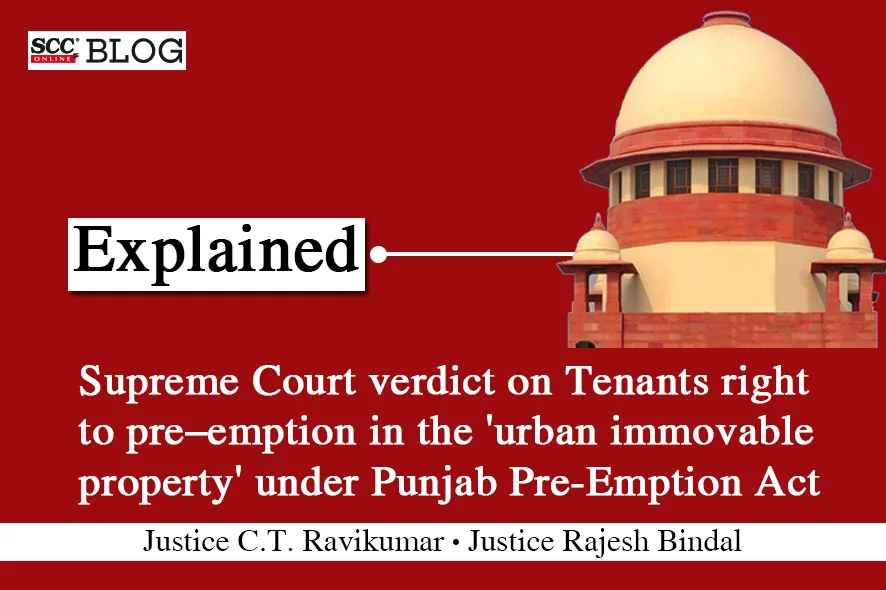Supreme Court: In an appeal filed against the judgment passed by the Punjab & Haryana High Court, the division bench of C.T. Ravikumar and Rajesh Bindal, JJ. while upholding tenants’ pre—emption rights in the ‘urban immovable property’ under the Punjab Pre-emption Act, 1913 (‘1913, Act’) said that ‘land’ and ‘immovable property’ are two different terms. The immovable property is more than the land on which certain construction has been made.
The respondents had filed a suit in 1984 for possession by pre-emption of the plot. The Trial Court decreed the suit. The judgment and decree of the Trial Court was upheld by the High Court.
The respondents claimed themselves to be the tenants in the property in dispute, since 1949. The same was sold by the owners to the appellants by way of a registered sale-deed. The respondents filed the suit exercising their right of pre-emption of the sale claiming that in terms of the provisions of the Act 1913, they had preferential right to purchase the property. They offered to pay the same sale consideration. The Trial Court decreed the suit subject to payment to the vendee after deducting 1/5th of the pre-emption amount deposited in the Court at the time of filing of the suit.
The Court took note of relevant provisions of the Punjab Alienation of Land Act, 1900 (‘1900 Act’) and 1913 Act and said that the right of the respondents/tenants in the property flows from Section 16 of the 1913 Act. It is not a matter of dispute that the respondents were tenants in the property from the year 1949 onwards where the rolling mill had been set up. The term ‘urban immovable property’ has been defined in Section 3(3) of the 1913 Act to mean immovable property within the limits of town, other than agricultural land. Section 3(1) defines any agricultural land to mean land as defined in 1900 Act. The term ‘land’ as defined in Section 2(3) of the 1900 Act excludes any site of any building in a town or village. Thus, the immovable property would be more than the land only or the land on which the construction has already been made. Thus, it concluded that the property in dispute on which right of pre-emption was sought to be exercised by the respondents was an urban immovable property.
Concerning whether the exemption of pre-emption as granted vide notification dated 08-10-1985 would be available to the property in dispute, the Court perused the notification and said that it has been issued in exercise of powers conferred under Section 8(2) of the 1913 Act, which enables the State Government to declare by notification either no right of pre-emption or only limited right will exist in any local area or with respect to any land or property or class of land or property. The notification provides that right of pre-emption shall not exist in respect of sale of land falling in the areas of municipalities in Haryana.
The Court noted that the term ‘land’ as such has not been defined in the 1913 Act and it is only the term ‘agricultural land’ which is defined. Further, it said that if the aforesaid notification is read with reference to the powers available with the State Government to grant exemption from pre-emption, it is evident that the same has been granted with reference to land only and not immovable property. The fact that Section 8(2) of the 1913 Act uses two terms independently, clearly suggests that the land and the immovable property have different meanings. It is evident even from the language of Section 15 of the 1913 Act, which also provides the right of pre-emption in respect of agricultural land and village immovable property.
Thus, it said that ‘land’ and ‘immovable property’ are two different terms. The immovable property is more than the land on which certain construction has been made.
Further, it added that as the notification dated 08-10-1985 limits its application for taking away the right of pre-emption only with reference to sale of land falling in the areas of any municipality. Thus, it is sale of immovable property, which is more than the land as a rolling mill had already been set up on the land, which was in occupation of the respondents as tenants.
[Jagmohan v. Badri Nath, 2024 SCC OnLine SC 108, decided on 06-02-2024]







